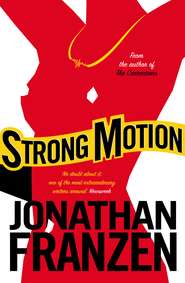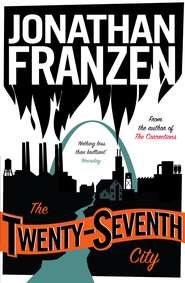По всем вопросам обращайтесь на: info@litportal.ru
(©) 2003-2024.
✖
The Corrections
Автор
Год написания книги
2018
Настройки чтения
Размер шрифта
Высота строк
Поля
“Well, as you know,” Enid said, “we’ve gone to Philadelphia for the last eight Christmases in a row, and Gary’s boys are old enough now that they might like to have a memory of Christmas at their grandparents’ house, and so I thought—”
“Damn!” came a cry from the living room.
Enid set down her glass and hurried from the kitchen. Alfred was sitting on the edge of the chaise in a somehow penal posture, his knees high and his back a little hunched, and was surveying the crash site of his third hors d’oeuvre. The gondola of bread had slipped from his fingers on its approach to his mouth and plunged to his knee, scattering wreckage and tumbling to the floor and finally coming to rest beneath the chaise. A wet pelt of roasted red pepper had adhered to the chaise’s flank. Shadows of oil-soak were forming around each clump of olive morsels on the upholstery. The emptied gondola lay on its side with its yellow-soaked, brown-stained white interior showing.
Denise squeezed past Enid with a damp sponge and went and knelt by Alfred. “Oh, Dad,” she said, “these are hard to handle, I should have realized.”
“Just get me a rag and I’ll clean it up.”
“No, here,” Denise said. Cupping one hand for a receptacle, she brushed the bits of olive from his knees and thighs. His hands shook in the air near her head as if he might have to push her away, but she did her work quickly, and soon she’d sponged the bits of olive up from the floor and was carrying the dirtied food back to the kitchen, where Enid had wanted a tiny extra splash of wine and in her hurry not to be conspicuous had poured a rather substantial tiny splash and downed it quickly.
“Anyway,” she said, “I thought that if you and Chip were interested, we could all have one last Christmas in St. Jude. What do you think of that idea?”
“I’ll be wherever you and Dad want to be,” Denise said.
“No, I’m asking you, though. I want to know if it’s something you’re especially interested in doing. If you’d especially like to have one last Christmas in the house you grew up in. Does it sound like it might be fun for you?”
“I can tell you right now,” Denise said, “there’s no way Caroline’s leaving Philly. It’s a fantasy to think otherwise. So if you want to see your grandkids, you’ll have to come east.”
“Denise, I’m asking what you want. Gary says he and Caroline haven’t ruled it out. I need to know if a Christmas in St. Jude is something that you really, really want for yourself. Because if all the rest of us are agreed that it’s important to be together as a family in St. Jude one last time—”
“Mother, it’s fine with me, if you think you can handle it.”
“I’ll need a little help in the kitchen is all.”
“I can help you in the kitchen. But I can only come for a few days.”
“You can’t take a week?”
“No.”
“Why not?”
“Mother.”
“Damn!” Alfred cried again from the living room as something vitreous, maybe a vase containing sunflowers, hit the floor with a cracking-open sound, a gulp of breakage. “Damn! Damn!”
Enid’s own nerves were so splintery she almost dropped her wineglass, and yet a part of her was grateful for this second mishap, whatever it was, because it gave Denise a small taste of what she had to put up with every day, around the clock, at home in St. Jude.
The night of Alfred’s seventy-fifth birthday had found Chip alone at Tilton Ledge pursuing sexual congress with his red chaise longue.
It was early January and the woods around Carparts Creek were soggy with melting snow. Only the shopping-center sky above central Connecticut and the digital readouts of his home electronics cast light on his carnal labors. He was kneeling at the feet of his chaise and sniffing its plush minutely, inch by inch, in hopes that some vaginal tang might still be lingering eight weeks after Melissa Paquette had lain here. Ordinarily distinct and identifiable smells—dust, sweat, urine, the dayroom reek of cigarette smoke, the fugitive afterscent of quim—became abstract and indistinguishable from oversmelling, and so he had to pause again and again to refresh his nostrils. He worked his lips down into the chaise’s buttoned navels and kissed the lint and grit and crumbs and hairs that had collected in them. None of the three spots where he thought he smelled Melissa was unambiguously tangy, but after exhaustive comparison he was able to settle on the least questionable of the three spots, near a button just south of the backrest, and give it his full nasal attention. He fingered other buttons with both hands, the cool plush chafing his nether parts in a poor approximation of Melissa’s skin, until finally he achieved sufficient belief in the smell’s reality—sufficient faith that he still possessed some relic of Melissa—to consummate the act. Then he rolled off his compliant antique and slumped on the floor with his pants undone and his head on the cushion, an hour closer to having failed to call his father on his birthday.
He smoked two cigarettes, lighting the second off the first. He turned on his television to a cable channel that was running a marathon of old Warner Bros. cartoons. At the edge of the pool of tubal glow he could see the mail that for nearly a week he’d been dropping, unopened, on the floor. Three letters from the college’s new acting provost were in the pile, also something ominous from the teachers’ retirement fund, also a letter from the college housing office with the words NOTICE OF EVICTION on the front of the envelope.
Earlier in the day, while killing some hours by circling in blue ballpoint ink every uppercase M in the front section of a month-old New York Times, Chip had concluded that he was behaving like a depressed person. Now, as his telephone began to ring, it occurred to him that a depressed person ought to continue staring at the TV and ignore the ringing—ought to light another cigarette and, with no trace of emotional affect, watch another cartoon while his machine took whoever’s message.
That his impulse, instead, was to jump to his feet and answer the phone—that he could so casually betray the arduous wasting of a day—cast doubt on the authenticity of his suffering. He felt as if he lacked the ability to lose all volition and connection with reality the way depressed people did in books and movies. It seemed to him, as he silenced the TV and hurried into his kitchen, that he was failing even at the miserable task of falling properly apart.
He zipped up his pants, turned on a light, and lifted the receiver. “Hello?”
“What’s going on there, Chip?” Denise said without preliminaries. “I just talked to Dad and he said he hadn’t heard from you.”
“Denise. Denise. Why are you shouting?”
“I’m shouting,” she said, “because I’m upset because it’s Dad’s seventy-fifth birthday and you haven’t called him and you didn’t send him a card. I’m upset because I’ve been working for twelve hours and I just called Dad and he’s worried about you. What’s going on there?”
Chip surprised himself by laughing. “What’s going on is that I’ve lost my job.”
“You didn’t get tenure?”
“No, I was fired,” he said. “They didn’t even let me teach the last two weeks of classes. Somebody else had to give my exams. And I can’t appeal the decision without calling a witness. And if I try to talk to my witness it’s just further evidence of my crime.”
“Who’s the witness? Witness to what?”
Chip took a bottle from the recycling bin, double-checked its emptiness, and returned it to the bin. “A former student of mine says I’m obsessed with her. She says I had a relationship with her and wrote her a term paper in a motel room. And unless I get a lawyer, which I can’t afford to do because they’ve cut my pay off, I’m not allowed to speak to this student. If I try to see her, it’s considered stalking.”
“Is she lying?” Denise said.
“Not that this is anything Mom and Dad need to know about.”
“Chip, is she lying?”
Spread open on Chip’s kitchen counter was the section of the Times in which he’d circled all the uppercase M’s. Rediscovering this artifact now, hours later, would have been like remembering a dream except that a remembered dream didn’t have the power to pull a waking person back into it, whereas the sight of a heavily marked story about severe new curtailments in Medicare and Medicaid benefits induced in Chip the same feeling of unease and unrealized lust, the same longing for unconsciousness, that had sent him to the chaise to sniff and grope. He had to struggle now to remind himself that he’d already gone to the chaise, he’d already taken that route to comfort and forgetfulness.
He folded the Times and dropped it on top of his heaping trash can.
“‘I never had sexual relations with that woman,’” he said.
“You know I’m judgmental about a lot of things,” Denise said, “but not about things like this.”
“I said I didn’t sleep with her.”
“I’m stressing, though,” Denise said, “that this is one area where absolutely anything you say to me will fall on sympathetic ears.” And she cleared her throat pointedly.
If Chip had wanted to come clean to someone in his family, his little sister would have been the obvious choice. Having dropped out of college and having married badly, Denise at least had some acquaintance with darkness and disappointment. Nobody but Enid, however, had ever mistaken Denise for a failure. The college she’d dropped out of was better than the one that Chip had graduated from, and her early marriage and more recent divorce had given her an emotional maturity that Chip was all too aware of lacking himself, and he suspected that even though Denise was working eighty hours a week she still managed to read more books than he did. In the last month, since he’d embarked on projects like digitally scanning Melissa Paquette’s face from a freshman facebook and suturing her head to obscene downloaded images and tinkering with these images pixel by pixel (and the hours did fly by when you were tinkering with pixels), he’d read no books at all.
“There was a misunderstanding,” he told Denise dully. “And then it was like they could hardly wait to fire me. And now I’m being denied due process.”
“Frankly,” Denise said, “it’s hard to see being fired as a bad thing. Colleges are nasty.”
“This was the one place in the world I thought I fit in.”
“I’m saying it’s very much to your credit that you don’t. Although what are you surviving on, financially?”
“Who said I was surviving?”
“Do you need a loan?”
















